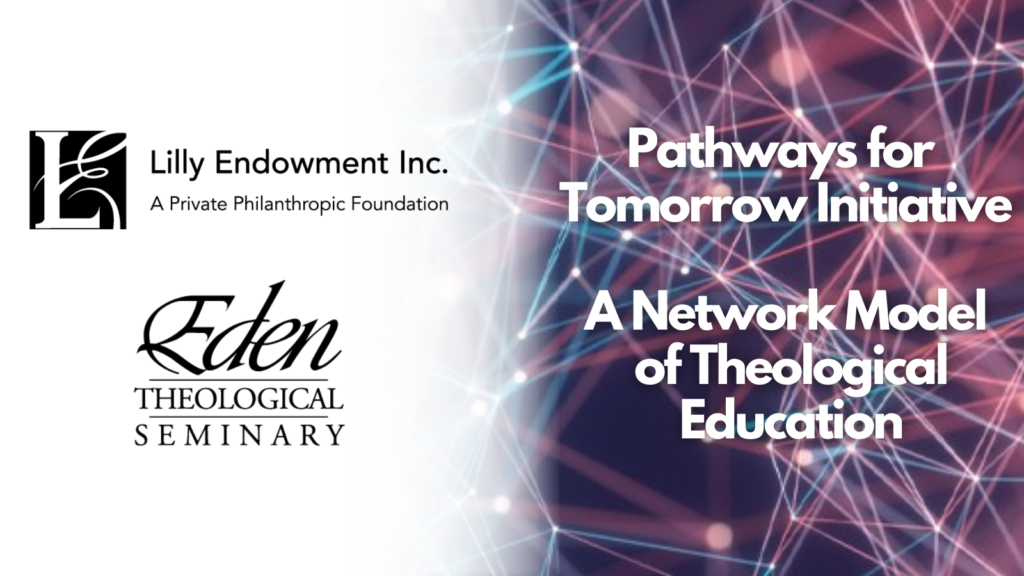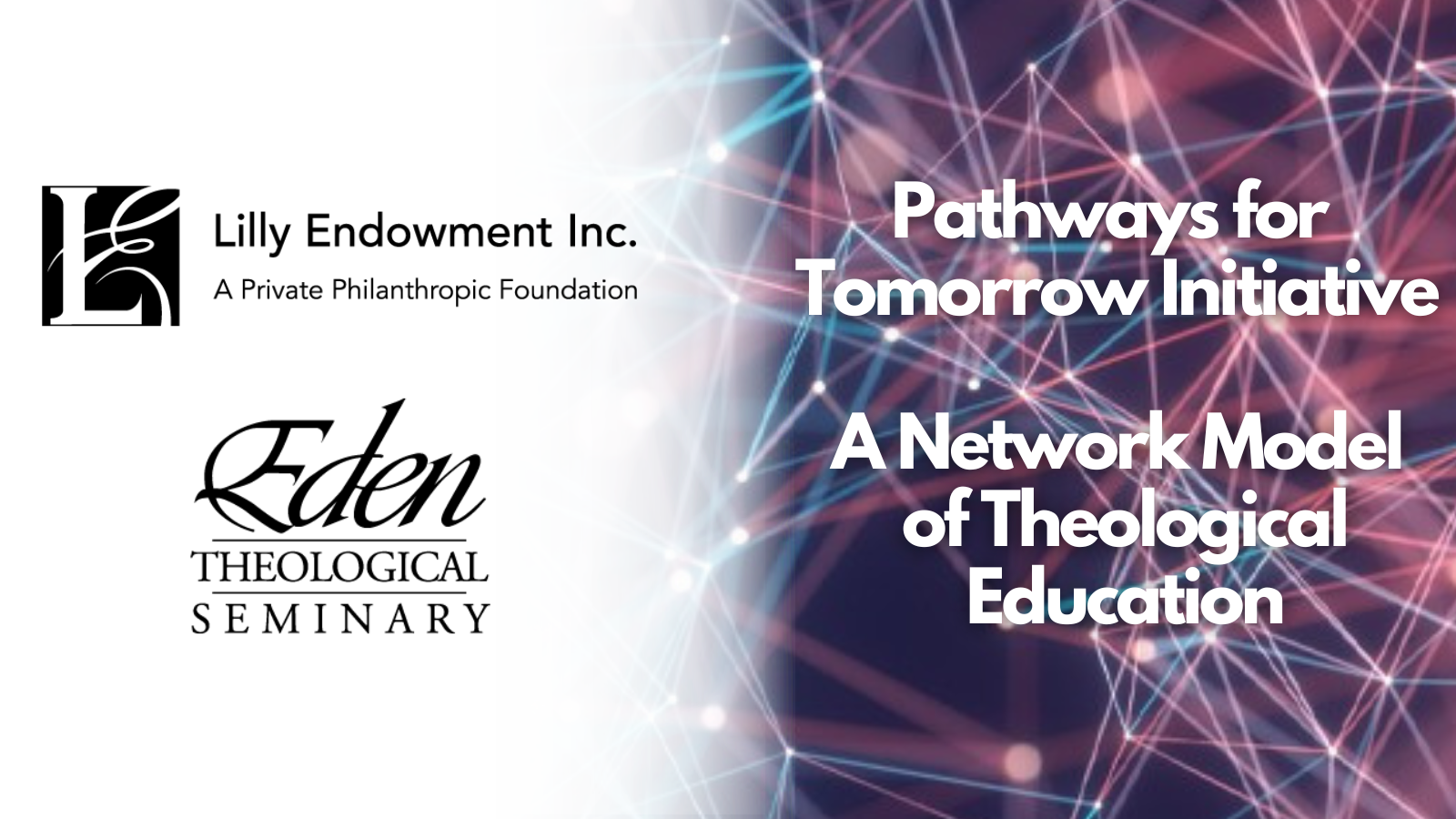Among the largest single grants received in its history, Eden Theological Seminary receives grant for $4,999,995 from Lilly Endowment Inc. to implement a Network Model of Theological Education. The programming and relationship building resourced by the grant will take place over the next five years.
Read UCC national news story here
The three initiatives of the Network Model include collaborations among theological schools, undergraduate colleges and universities and United Church of Christ conferences.
“In the Network Model of Theological Education we are navigating a historic shift in the culture of higher education and of the church, and we are encouraged to do so in such good company and toward such good purpose.”
– President Deborah Krause
Eden Theological Seminary has received a grant of $4,999,995 from Lilly Endowment Inc. to help implement a Network Model of Theological Education.
The program is being funded through the third and final phase of Lilly Endowment’s Pathways for Tomorrow Initiative. The Initiative is designed to help theological schools across the United States and Canada as they prioritize and respond to the most pressing challenges they face as they prepare pastoral leaders for Christian congregations both now and into the future.
Eden Theological Seminary’s Network Model of Theological Education includes three initiatives engaging institutional, denominational, and congregational partners across North America to build capacity, increase demand, and expand access for theological education in service of congregations and ministries of the progressive Christian movement.
- Theological Schools – Sharing faculty resources and courses to equip and empower leaders for the progressive Christian movement.
- Undergraduate Colleges and Universities – Awakening vocations for social transformation and congregational ministry.
- United Church of Christ Conferences – Supporting assessment and educational resources to form capacities for “Marks of Faithful and Effective Authorized Ministers”
Drawing on over a half century of demonstrated impact in its Contextual Education program, Eden is adapting its curriculum centered on immersive, experiential, mentored learning in diverse contexts of ministry to distance learning. We are collaborating with the church and its institutions of higher learning to create greater access for leaders to be formed and empowered for transformational ministries in the congregations and communities they serve. Far from seeing the theological school as a center to which the church and its leaders come for instruction, the Network Model positions the Seminary working collaboratively with other schools, organizations, and denominations, to equip and empower leaders the church needs for today.
Eden’s President, Rev. Dr. Deborah Krause, gives thanks. “Lilly Endowment’s challenge to collaborate with other institutions and organizations empowered Eden Seminary to resist habits of competition in our operation as a school to foster connections to join our resources with those of other schools and denominational bodies to strengthen and support the church and its leaders. In the Network Model of Theological Education we are navigating a historic shift in the culture of higher education and of the church, and we are encouraged to do so in such good company and toward such good purpose.”
Schools and conferences providing letters stating their support of the collaborative initiatives include: United Theological Seminary, Chicago Theological Seminary, Christian Theological Seminary, Memphis Theological Seminary, Lutheran Theological Seminary, Saskatoon, Canada, St. Andrew’s College, Canada, College of Emmanuel & St. Chad, Saskatoon, Canada, Lakeland University, Tougaloo College, LeMoyne-Owen College, Hawaiʿi Conference UCC, Rocky Mountain Conference UCC, Illinois South Conference UCC, Missouri Mid-South Conference UCC, Penn Central Conference UCC.
Eden Theological Seminary is one of 16 theological schools that has received grants to fund large-scale, highly collaborative programs through the Pathways initiative. Lilly Endowment believes these programs have the potential to become models for other schools as they seek to strengthen the way they educate pastors and other congregational leaders.
“Theological schools play an essential role in ensuring that Christian congregations have a steady stream of well-prepared leaders to guide their ministries,” said Christopher L. Coble, the Endowment’s vice president for religion. “Many theological schools believe that their paths to the future depend on their abilities to form strategic partnerships with other schools and church agencies. These grants will help seminaries develop innovative and collaborative approaches to theological education that we believe will strengthen their efforts to prepare and support excellent leaders for Christian communities into the future.”
Lilly Endowment launched the Pathways initiative in January 2021 because of its longstanding interest in supporting efforts to enhance and sustain the vitality of Christian congregations by strengthening the leadership capacities of pastors and congregational lay leaders.
About Lilly Endowment Inc.
Lilly Endowment Inc. is a private philanthropic foundation created in 1937 by J.K. Lilly Sr. and his sons Eli and J.K. Jr. through gifts of stock in their pharmaceutical business, Eli Lilly and Company. While those gifts remain the financial bedrock of the Endowment, the Endowment is a separate entity from the company, with a distinct governing board, staff and location. In keeping with the founders’ wishes, the Endowment supports the causes of community development, education and religion and maintains a special commitment to its hometown, Indianapolis, and home state, Indiana. The principal aim of the Endowment’s religion grantmaking is to deepen and enrich the lives of American Christians, primarily by seeking out and supporting efforts that enhance the vitality of congregations and strengthen the pastoral and lay leadership of Christian communities. The Endowment also seeks to improve public understanding of diverse religious traditions by supporting fair and accurate portrayals of the role religion plays in the United States and across the globe.



